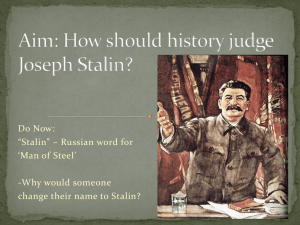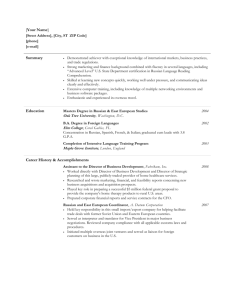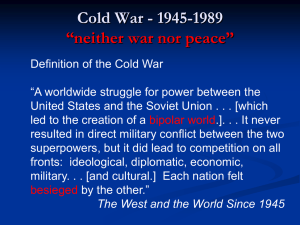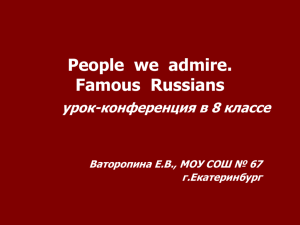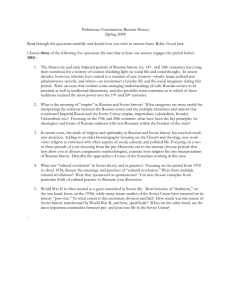imasisa of Avi1 we Pv
advertisement
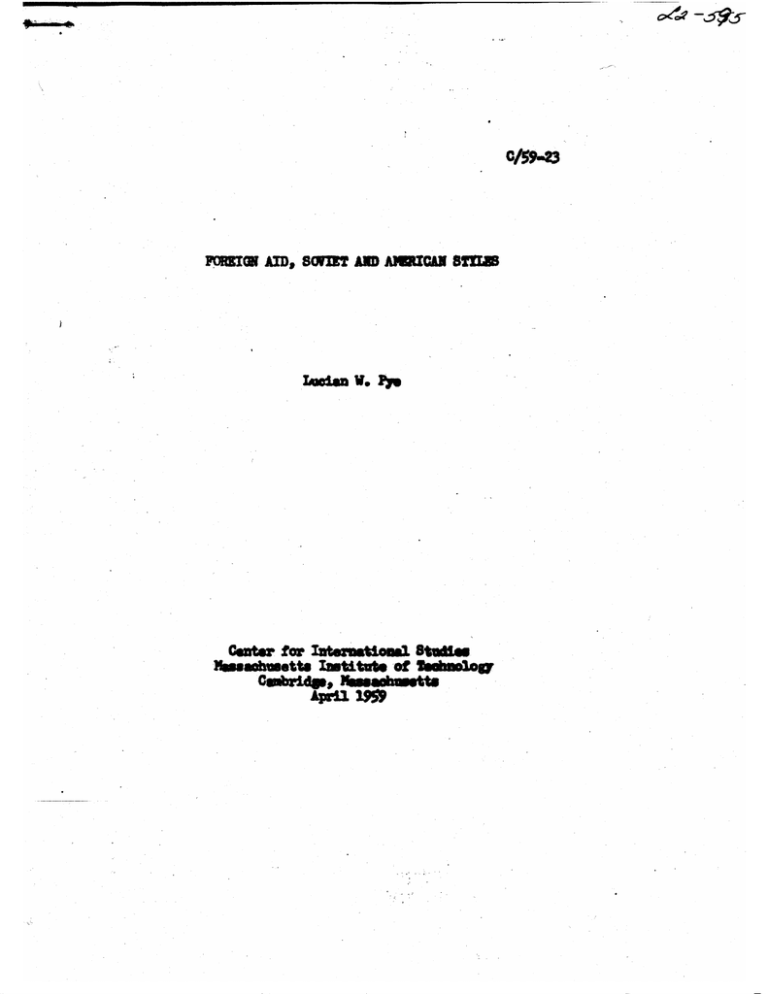
FORMI~ AID, 8SN1! AND AXA TL imasisa we Pv CUAtWz for. Iaemtou tuia Nssabietts Immututea of soIUU0Og CO b Xldp, RM WbIMUtS Avi1 2" FORETGN AID, SOVTT AND AITCAN STIS OR THE HANDSOME RUTSSTAN AND TIE UGLY AIERICAN Economic aid and technic t1 assistance were essentially American innow vations in the realm of foreign affairs. In the classical nation-state system allies did on occasion assist each- other ith credits and wealthier states frequently used money to influence poorer and weaker nations. - ever, foreign aid in the modern sense is clearly the product of American decisions. Indeed, some might say that foreign aid' reflects acctrately the peculiar genius of the American people, for it combines an op-o'rtunity for expressing idealism and generosity with an eminently prrctical device for advancing our enlightened self-interest. remains that during the immediate post-&ar Be this as it may, the fact. we had a monopoly in this field that was only slihtly less complete than our monopoly of atomic weaponse It is therefore qite underatend'ble that we should have felt a deep sense of uneesiness when Russia turned to ruble diplomacy and her cnm. paign of economic aid to the unco nitted arees. Indeed, when the Soviets shortly after breaking. our atomic monopoly, announced their intentions to provide massive amounts of economic assistance to the les we were assailed by a host of doubts * to full advantage? Were we aware o istrumntlof foreign policy? Had we developed areas, ead our period of monopoly the potntialities of this unique Shouldn't we -assume the Russians will rrove 'I 2 themselves more skilled and adept in utilising the instrument for their self-interest? We were prone to discm'nt our years of experierce, and tend.- ed to feel that the advantage lq with the Russians ;s late--comers who would surely profit from our early mistakes* We even began to wonder whether in this form of competition the Soviet system might not have some inherent advantages: could they not allocate resources, particularly human resources, in a more efficient mnnerl were they not free to engave in long run planning; and certainly they jould never have to be embarrassed by Congressional serutiny which can produce unkind remWrks about the behavior- of foreign govrnments, In this otaft of mind it wa easy for us to see countries which had steadfastly withstood all our efforts at friendship becoming the easy victims of Russian blandishments. It is true that som cynics and critics of foreign aid said we ought to welcome the Russian move because now the ungrateful people of the recipient countries would be able to vent their hostility on the Soviets and not Just on us. In part our sense of uneasiness came from the novelty of the Soviet actions, and in part it stemned from our tendency to ricture the Russians as being unaffected by the difficulties and handicaps that have been most frustrating for us. However, there seems to be a far deeper source for our anxiety, for at a more profound level Soviet policies have brottht in to question the most fundamental assumptions and the most sophieticated lines of reasoning behind our total foreign aid effort. The Russian de- cision to utilize foreign aid has challanged not ,ust some superfickie views about techniques but our most advanced theories about the political f p r significance of economic aid. welcomS For according to these theories we should r Soviet contributions to economic growth in the underdevel opled meas since this should mean that they are working against their interests and in favor of ours. To rephrase Lenin, the Russians would be acting as "the grave digters of Communism." If this is not so then it would seem that our theories are inaccurate and we have been preising our actions on fallacious notions. During the last decade considerable thought has gone into all aspects of foreign aid, and if we survey the opinions of those favorable to foreign aid, as they have been expressed in Congressional hearings, administration statements and the general literature on the subject, we find that there is a remarkablr tidespread consensus on the nature and purpose of our economic aid programs. It is thus possible to speak of an American doctrine on the sutject; and it is this doctrine, based upon our best judgments and an elsbhwate and subtle set of reasons, which has been challenged by the new Soviet campaigns. IBiefly, American doctrine holds that foreign aid is a long term proposition which works to our advantage by creating a profound process of social change in which a steadi1r increasing gross national product will provide the essential basis for a stable political process. proper, It is in- and indeed naive, to expect an immediate return on our aid. Ac- oding to Amrican doctrine we are not seekin. to bIy friendships or inflence the short range policies of the ,recipient countries. Instead we are concerned with the evolution of the underdeveloped countries into uvdern nation-states, 9 14 In our view foreign aid can serve a broad range of functions by helping to give the newly independent comtries a sense of to structive purpose for their sentiments of nationalism. and con- If the leaders of underdeveloped countries comit themselves to serious programs of economic development then their restless people will be able to channel their am. bitions in constructive directions. custom People who are losing the fatalism of and tradition will be able to find a realistic basis for their hopes for a better life for themselves and their children. There will be less frustration and hence less irrationality, Amrican doctrine has thus conceived of foreign aid as providing not just the physical basis but also the psychological Atmosphere necessary for the establishment of a more stable world. By giving purpose, direction and hope to those who want to be a part of the modern world, foreign aid should reduce all irrational tendencies and hence weaken the appeals of Communism and strengthen democratic institutions. Thus according to our most sophisticated views we can, and we should, ignore day-to.day political considerations in favor of aid programs based upon advanced economic theories, because ultimately such an approach will reflect a profound political wisdom. The reason why we can confidently follow this initially economic approach to our political objectives lies in the peculiar nature of economic growth. Our theories sugwest to us that once stagnant economics have been given the necessary push from the outside then they can in a short tim reach a stage in which they will be able to continmw to grow without added external aid; once the snowball has been started down the bill, it can gain momentum even as it grows in sie. Pinally, the logic of our doctrines holds that since economic growth is an impersonal phenomenon it matters little where the capital and refsources necessary for such development cowe from. Therefore if we have the courage to follow our doctrines wherever they may lead us, we can not escape the conclusion that Soviet aid should have the effect of speeding up precisely the course of events which American aid is designed to facilitate. To question this possibility is to question some of the basic tents of our doctrine, Presumably Soviet think- ing does not bring them to the same conclusions about the nature and potentialities of foreign aid. We can not avoid a sense of uneasiness as we ask whether it is our doctrines or the Russians' that coe t he closest to comprehending reality. It is appropriate that there should be at this stage numerous attempts to reappraise the functions of foreign aid. The old issue of whether there should even be foreign aid program is dead; we will not give up a major instrument of foreign policy at this stage. The problem is to gain a keener appreciation of the nature of foreign aid and particularly its potentialities and its limitations for foreign policy. III It is in the spirit of such a quest for understanding that we ma take note of what seems to be some of the basic differences in the American and Russian approaches to foreign aid. Indeed, an analysis of opera- tional styles in economic assistance programs can rrovide an interesting basis for examining fundamental assumptions. This is because any strategy of economic aid mst reflect notions about the character of human society, 6 the nature of change and progress, the role of himan effort in controlling history, the relationship of the economic and political spheres, and other similar issues about nB!) and society. As a point of departure we m observe that there appems to be con- siderable difference between American and Russian assumptions about the costs and difficulties of inducing and accelerating social change. In fact we seem to have diametrically opposed views about how hard it is to encourage social change. mistic one in that it The American approach is essentially an opti- is premised on the belief that great changes can be expected from relatively little expenditure of energy. Foreign aid is understood to be only the marginal investuent of effort necessary to push transitional societies into self-sustaining and nearly automatic growth. A sa1 input can produce a disproportionately large output because of the operations of the "multiplier effect* in the econoqw. The problem is often only that of locating the particular "lever" or "button' that must be pushed to set off the expected chain reaction. It should be noted that we are often prepared to expend prodigious amounts of energy to locate the trigger, but the expectation is always that when the right thing is done the Ultimate effects will be far greater t han tLhe initial ieasures. Indeed, it massive a ounts of aid have produced only slight change, then we tend to be susriciots about whether the program is being wisely administered. In contvast it seem that the Russians tend to the view that social change is a terribly and bruta3ly costly process in which massive assaults on the existing order are necessary to produce modest degrees of change. In their thinking huge inputs can yield only minor outputs. Products of a revolutionary experience and comuitted to an ideology of struggle, the Russians have few illusions about the costs of altering the structure of a society. Certainly most Russians are accutely aware that all social changes in the Soviet Union have been extremely demanding and painful. Only recently has explicit Camnmnist doctrine accepted the point of view that parliamentary democracy and popular elections can ever bo the Hwevers in spite of vehicle for historically significant changes. Khrushchev's pronouncement on the possibilities of gaining power through legal means which has given respectability to the Conmmnist parties of the underdeveloped regions, the basic Russian feeling still seems to be Since that no efforts short of revolution can bring fundamental changes. the Russians are only impressed with such fundamental changes they can. not avoid discounting the significance of all non-Conunist programs of social change. The path to the next stage in history is always a difficult one and only those who are prepared to struggle and suffer can follow it. Ir- deed, all who would influence the course of history, whether they be the early bourgeoisie who produced the first industrial revolutions in Europe or the pre ent-day "vanguards of the proltariat' in. Russia and China, have had to be willing to engage in heroic struggle. For the process of social change is comparable to war; the old order must be 'overpowered, 'stormed" and 'assaulted.' A second distim-tion between Ameri n and Russianthinking, which is consistent with these first two sets of assumptions question of the popularity of social change. is related to the In the 'Mericsn picture of 8 the underdeveloped regions we tend to see main1g People who are anxious for change and impatient with anythng that would hold back progress and the realization of a modern sociei. In the 601rican view there is little sense of inconsistency between depicting the people of the Underdeveloped countries as engrossed in a "revolution of rising Opectations" and spending considerable sums on techniqes and prograum to stimulate, prod and encourage these very sam people into siving up their old was and taking greater interest in the prospects for chante, People may be ignorant of the possibilities for self-improvemnt, but once they are shown the way they are certain to be eager to accept the new and reject their old and inefficient ways. It is this assumption which gives us such confidence In the demonstrational effects of pilot projects. A few well run model en- terprises should have almost unlimited influence on all who see or hear about them. Also, since we have little appreciation for why people might not be continually enthusiastic for change we tend to be rather discouraged ty examples of back-sliding. In our thinking there is very little room for the idea that traditional modes of life can be omefortable while change and progress can be excessively painful. We are too much the products of acculturation ourself to hold such views, for we know the value of be. coming Americanized but not the cota In the Russian mode of thinking people are generally seen as stubbornly resisting all forsm of change. In their minds the problem of stimu- lating change is more than just tie firm grip of traditions people even when presented with the opportunity to improve their lot are generally 9 too lasy and slovenly to change- their habits. Indeed, if people are not constantly prodded they are certain to slip back into their old practices. Such students of Bolshevik behavior as Nathan Leiter and Merle Fainsod have noted the anxieties the Russian Communists have about relaxing, for in their view the alternative to determined effort is disintegration and the aimless ways of the peasant, The theme that runs through the entire early history of the radical movement among Russian intellectuals is that of frustration and exasperation at the Russian peasant for not showing greater interest in change and progress. In the Russian view today any attempt at modernising is certain to be only a superficial effort if it is not driven on by the select few who understand the problem of s ocial change. Thus in spite of reference to "revolutionary tides," and "intensified contradictions" which bring about "popular demands," the basic Russian feeling is that they must work for change in a world in which people tend to resist change tenaciously. If we turn next to the problem of planning social change we find that a third difference in American and oussian thinking relates to time perspectives and the relationship of thb short and the long run. Our feeling is quite clearly that the long run is all important, and considerations of the short run are a c onstant source of danger that threaten the realisation of our ultimate objectives. We are f irmly convinced that a great danger is that administrators will be overpowered by the demands of their day-to-day problems and lose sight of our long run objectives. It is the immediate world which is the frustrating and exasperating one which can absorb all of one' a energies and time. Conversely, we tend to feel that while the long run is all important 10 it does not of its own accord demand our attentions. Indeed, we seem to feel that if we could only pause for a moment and reflect then we should have no difficulty whatsoever in comprehending all long term problems. The problem of thinking through and "solving" such problems is assumed to be relatiVly? easy, if only we could get the time and escape for a moment from the pressure of inmediate problems. The assumption is that a little thought can go a long way in producing understanding about long range issues. A glance up from our daily tasks should be enough to give us a complete grasp of the configuration of the future. Our suspicion is always that others, and particularly our enemies, are somehow able to avoid the demands of the present and follow more long run considerations. The Russian tradition, in contrast, is that the long run is predetermined by the "laws of history" and all attention and energies should be directed to the problems immediately at hand. A basic Bolshevik attitude is that people are all too likely to idle their time away with heated but futile and pointless discussions of the distant future. Some students of Russian affairs see the Bolsheviks as standing in sharp opposition to the propensities of earlier Russian intellectuals for engaging in endless speculation and agonizing soul searching about ultimate questions and the goals of history. Nothing can come of such activities and pro- gress can only come out of a complete commitment to the pressing problems of the moment. Effective action is in Cai short run action. The true revolutionary takes pride in not wasting time or energy in thinking about long term problems; instead he throws niaself completely into dyto-day problems. 11 The Russians thus tend to see dangers in becoming absorbed with long run considerations and great virtue in concentrating attentions on current problems. Their suspicions are exactly the opposite of ours, for they tend to believe that their enemies are better able to focus their energies on immediate iSsues w hile they fear that those who profess to champion revolution wil have their eyes fixed too much on the long run and will thus be ineffectual. This brings us to what is possibly the most critical difference in underlying assumptions of the Aerican and Russian doctrines on foreign aid: the difference in the predictability of social change. Oddly enough even though we are not as given to explicit theories about the nature of society as the Russians are, we do seem to hold in our minds a considerably more complicated, more subtile, and more integrated picture of haman societies. In particular we tend to think of a society as being so organised that a change in one realm is certain to bring about changes in aU others. Since all phases of life are interrelated it should be in our view possible to predict the indirect consequences of aTr policy. Our minds are quite prepared to accept the suggestion that the secondary and tertiary effects of ay policy action can be readily charted through a series of chain reactions. Indeed, we accept so completely the possibility of such pre- dictions tiat we have no difficulty with the idea that it is unnecessary to concentrate our efforts directly toward our most desired objectives. Such objectives can often best be realised by an indirect approach. It is this view of the interrelated nature of the social system which a 12 convinces us that changes in the economic sphere will have predictable consequences in the political realm. Although the pattern of cause and effects may be extremely complicated we are fairly certain that it must We even take at times the position run its course throughout the society. that very delicate and fine adjustments can be made through indirect nanipulations of facets of the society. We tend to expect that in ary society it should be possible to apply techniques of control and guidance comparable to those we have in our mechanisms for our morfitary policies. The Russians, in spite of a formal ideology that pretends to a scientific explanation of the works of human societies, act as though they are far less confident about the possibilities of predicting the iddirect consequences of policy actions than we are. The Russians generally take a more direct and a more frontal approach to the problem of directing social change. Since massive attacks on a society are necessary to produce even limited changes, it is impossible to expect much of the secondary and tertiary effects of overt policies. The Russians are, of course, informed by their Marxist doctrines that economic relationships determine the nature of the political sphere, and it might be assumed that this would make them more sensitive than we are to the possibilities of making marginal changes. in the economic sphere In order to influence the course of political development. It seems, however, that in practice the Russian assumption is that only revolutionary changes in the economic order will produce significant political change, that is cange that is equal to the limited number of stages of history recognised 13 by Marxism. Short of such fundamental change in the structure of society there is little possibility of subtile and indirect manipulation of the social order. Instead, economic power can be, and often is, directly em.- ployed as political power; , the capitalists employ their financial power to "suppress" and "crush down" the workers, and thus the struggle is a direct one. In the final analysis the Russians act as though it is impossible to predict the indirect effects of any action, and therefore it is absolutely essential to gain complete and direct control of events* Nothing that is really important can be left to secondary processes; all important objectives must be directly attacked. Since the day-to-day workings of the social order can not be predicted all effort must be directed to controlling and commandinE all important developments. This feeling about the un- predictability of the immediate future and their views about the importance of the short run tend to reinforce each other in the Russian mind and produce the strong feeling that there is an absolute need to "control" all events. In contrast we are far more prepared to remove ourselves several steps from even those developments we feel to be highly important. ones tho see wisdom in dams and in We are the griculture in the underdeveloped re- gions which will have long run effects and only indirectly imfluence the course of political development. The Russians tend to invest in those activities which are likely to have a direct and immediate effect on peoples' political views: sport stadiums, hotels, pavement for streets, factories, and other enterprises which are likely to be highly visible in 14 the recipient country. Our feelings about the importance of the indirect effects of any policy are such that we welcome cooperative arrangements with recipient governments under which we may have little direct administrative control. In contrast, the Russians even w hen the project is a "gift" insist on retaining all administrative controls during the planning and building stages. This brings us to a final distinction in the American and Rssian approaches t oward foreign aid, namely attitudes toward the autonomy and interrelatedness of specialized bodies of knowledge about human society. It seems that in spite of our mental image of the interrelatedness of all facets of society, we t end to act as though we believed that each of the spheres into which we arbitrarily divide society has its own "laws" which should be acknowledged and respected. We accept the idea that there are different perspectives for viewing human behavior and these generally correspond to the separate academic disciplines. Thus we have the economic and the socio- logical, the psychological and the political approaches, assumed to have its own separate body of "laws." and each one is This means that we tend to act as though we believed that programs can be guided by "economic" or "technical" or "administrative" principles and hence they are essentially apolitical in character. Thus we are prepared to claim that our foreign aid efforts are inherently "non-political" and we fully expect other countries to recognize this to be the case. At the same t ime we do have t he view that the indirect consequences of our economic policies can be f elt in the political realm. We seem to push the possibility of a contradiction out of our minds by the assumption that in the final analysis there must be a basic harwny among the various What is good bodies of knowledge and perepetives for viewing society. sense according to economic theory must also be good politically. inconceivable tc us that there can be any fudaI ntal conflicts between the results of the various approaches or disciplines. assune that if It is We also tend to we act according to the best knowledge in any particular field we must also be acting in the best interest of the United States. The assumption is thus that there is not only a basic harmory of the spheres of knowledge but that this harmony extends on to the American national interest. It is true that we also believe that the specialized knowledge of arg "technician" can be the servant of any master, and that in the last analysis the expert must get his guidance from values that stand outside of his body of knowledge, and thus all specialists must accept the direction of the expert in values, that is the politician. Thus the economist, like the soldier and like all other specialists, will claim that guiding choices in policy must come from the political authorities. However, in spite of this formal view, all specialists tend to feel that they are qualified experts in the realm of values and hence they at least act as though they are capable of judging our national interest. This, of course, leads to the tendency of the various experts to see their specialties as being peculiarly important to the national interest. From these differen- ces in emphasis can come many conflicts within our government; but we do 16 not permit these manifestations of conflict to make us doubt the inherent harmony of all knowledge because we- believe that such conflicts come only when people either take "too narrow" a view or ignore their basic knowledge to play "politics" and "build empires." The Russians seem to avoid many of these problems by assuming that there are no specialized bodies of knowledge which are not subservient to political considerations, for all knowledge can be used to political advantage The nnity of society is for the Russians the all pervasive charac- ter of politics. There are no such things as "apolitical" acts in inter- national affairs, and therefore there is no point in pretending that foreign aid is not influenced by political ambitions. The Russians thus tend to act as though explicitly political considerations provide the only basis for ensuring the harmony of the various specialised bodies of knowledge. Indeed, in the Russian mind there seems to be no such thing as neutral bodies of knowledge; there are instead "bourgeois economic theories" and "Communist theories." All must bow to the Party and to political considerations. It may be helpful to summarize the differences we have been noting by presenting them in the form of a paradigm. Russian American 1. Great social change can come from marginal investments. Posibility of small input resulting in large output because of "multiplier effect." .. Social change is extremely costly; big investments of effort yield slight changes. 17 Russian, cont. American, cont, 2. Change is progress and it 2. Change is progress but people resist it. is popular. 3a 4.o People will "naturally" work for self-improvement, 3. People will "naturally 'trop back into lasy ways. The long run is all important, 4&. The long, run is predetermined, but people tend to waste the r time and energies in idle specula ions about the distuit future. Nee is for people to channel their nergies into the short-run. One s enemies and compeditors have the advantage of being able to direct effectively all their attentions to iuuediate problems. but short run considerations tend to absorb all one's time and ener- gies. 5. and compeditors have Onea's e advantage of being able i reflect on long run, 5. 6. All aspects of society are interrelated; secondary and tertiary effects important because of Rub Goldberg vision of society. 6. Secondary and tertiary effects un- 7. Indirect effects of policy predictable and hence direct controls not necessary, 7. 8. Different bodies of knowledge have 8. their own "laws" and hence possible to have "apolitical" policies. important; necessity for a frontal assault in achieving all objectives because indirect manipulations ineffectual. Limited possibility for predicting immediate effects of policies, and hence need for constant control. All specialised knowledge the sirvant of political considerations, and hence no action can be "apolitical." IV It would seem from these observations that the Russians consider economic aid to be considerably more blunt and limited as an instrument of policy than we do. Indeed, in many respects their view seems to be closer to an earlier American view which we are rather proud of outgrowing. It is, of course, impossible to state with confidence what are the Soviet expectations 18 about foreign aid. From their behavior, however, we can draw conclusions which all point to a more directly political use of aid than is our practice. Fundamentally the Soviets seem t o expect that economic aid will lead to the establishment of a definite pattern of economic relationships which will provide in time the basis for direct political influence, This is the type of simple relationship between the economie and the political spheres which has always seemed most "natural" in the Soviet mind: capitalism leads to the search for new markets and new sources of raw materials which in turn leads to the establishment of colonialism. In their own case they must see foreign aid as a device for gaining respectability for Coumnism and reducing hostilities toward the Soviet bloc and the national Communist parties. Certainly they are anxious to neutralise Western influence and present themselves as a major power capable of assisting weak nations. Foreign aid also provides a unique opportunity for suggesting that the Soviets have answers to the problem of rapid industrial development and that they are prepared to teach others. Above all else the Soviets seem quite prepared to conceive of foreign aid as simply a method for gaining entry into a foreign society so as to carry out other activities. Tbey are fully ready to use foreign aid to win friends and gain direct power. In fact the Russians are quite frank in stating that they are ready to use their aid to win friends and strengthen "fraternal bonds;" no where in Russian propaganda can one find a counterpart to the American claim that we do not think of foreign aid as a means for merely winning friends. 19 The Russian approach seem t o be quite direct and uncomplicated, but what about the question we posed at the beginning: could it be that by concentrating on the short-run potentialities of foreign aid, they are in part working for long-range developments which would favor democracy and harm Communism? Are the Russians so ugropic that t bey cannot see that t bey may be helping us t o realize our objectives? Presumably the Soviets are not disturbed by this possibility because in their view foreign aid activities are far too marginal a force to produce significant change in the social order. If we turn to Communist doctrines on the underdeveloped regions, we find that they have quite explicitly explained their understanding of all non-Comnunist attempts at economic development. Briefly, in their view all such programs represent efforts at creating a form of "bureaucratic capitalism," which differs from socialism in that it is not founded on a strong class basis. Those involved in developing these countries, in the Communist way of thinking, are mainly members of the intelligents iand other technicians and administrators, who all belong to the petty bourgeois class. In Communist thought the distinctive features of this class is a tendency to be unstable, vacillating, and indecisive in political activities. Petty bourgeois leaders may act in opportunistic fashions, but they tend to be extremely ineffectual and easy targets for outside maniplations. Above all else they do not have strong roots in their societies for they are not members of t he historically significant classes, the proletariat and the big bourgeoisie. The sum effect of their attempts at economic 20 development will thus be little more than the creation of projects which will be mainly of interest to administrators and technicians who have limited political interests. Those involved in the building of "bureau.. cratic capitalism" are supposed to lose touch with the masses even as they achieve greater successes in their enterprises. This suggests, when shorn of its Communist jargon, that the Soviets do not expect the development programs which were initiated br the Nehrus and the Nassers, the U Nus ad the Sukarnos to yield significant changes. Rather the Russians may expect that by focusing their energies on administrative problems, these leaders may tend to isolate themselves even further from the masses of their peoples, V This brings us to the final question: are the closest to reality? whose views about foreign aid This of course is the question that lies behind our sense of anxiety and uneasiness over the Soviet campaigns in foreign aid. question. It seems that there probably is no easy answer to this For, first of all, foreign aid is certainly one of those areas of activity in 'rhich the requirements for public policy and action have far outstripped the existing body of sound and empirically tested knowledge. Research in the social sciences has not in the past touched on many of the critical questions raised by foreign ald progras, and given our current state of knowledge it is certain that policy will have to continue to run ahead of tested theory for some t ine to come. 21 There is, however, no reason to suspect that as our knowledge expands it will show the Russians to have a more accurate understanding. there is every reason to expect the opposite to be the case. Indeed, Certainly in the development of our academic disciplines we have constantly proved that our knowledge about the nature of societies and human behavior is far superior to that of the sts, Also our policies, particularly In such areas as foreign aid, have always been extremely sensitive to the growth of sound knowledge in the social sciences. In contrast Soviet policies have to be accommodated to- the perspectives that their ideology gives them. There is, however, reason to believe that in time it will appear that both the American and tie Russian assumptions as presented here are much too logical and clear-cut. It will probably seem in time that different societies are likely to respond in quite different ways to efforts to stimulate economic growth. Therefore we can probably look forward to a time in which we will recognise a wide range of foreign aid prograns, each appropriate to a different kind of a society. We will then probably be inclined to think of f oreign aid as an instrument of policy which can respond to a wide choice of strategies, just as the military and diplomatic instruments can. Finally, it should be noted that the distinctions we have been making really represent differences in the 9 tyle in which we and the Russians conduct ourselves., being ourselves. In thinking the way we do about foreign aid we are Indeed, as a last observation about American behavior p 22 we may note that our anxiety over the Soviet foreign aid effort magr be nothing more than an expression of t he masochistic streak we seem t o have when our thoughts turn to foreign affairs: we tend to be sharply critical of our own abilities and suspect that our enemies are more brilliant and skillful. done. If our anxieties stir us to greater efforts no harm will be The real <nger is that feelings of s elf-doubt and demands for re- examination of our efforts will undermine our self-confidence to the point that we will be less able to act in an effective and decisive manner, which is a part of our basic style of action.
